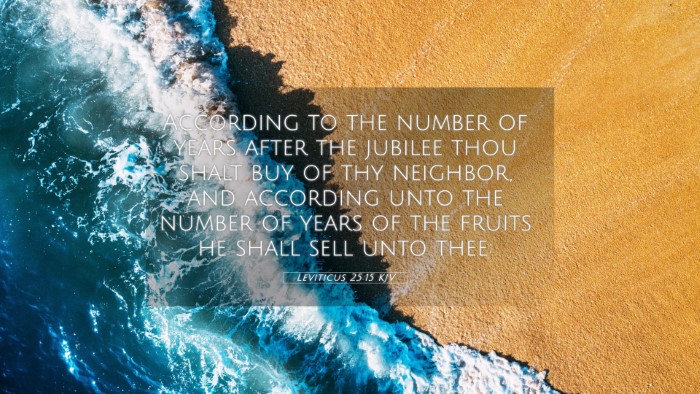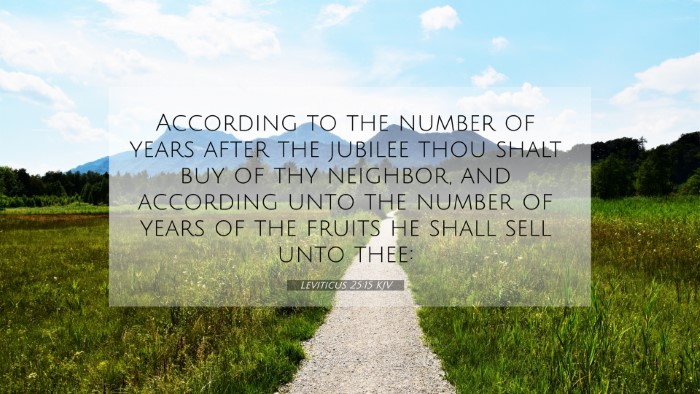Understanding Leviticus 25:15
Bible Verse: "According to the number of years after the jubilee thou shalt buy of thy neighbor, and according unto the number of years of the fruits he shall sell unto thee." (Leviticus 25:15)
Context and Significance
The command in Leviticus 25:15 addresses the economic practices in Israel, focusing on equitable transactions. This regulation directly connects to the jubilee period, which occurred every fifty years when land was returned to its original owners, ensuring that no family would be permanently disadvantaged.
Interpretation Insights
This verse emphasizes fairness and justice in monetary dealings. The sale and purchase of land were not merely considered business transactions, but rather acts that reflected God's provision and care for His people.
Commentaries provide further insights into the implications behind this verse:
- Matthew Henry: Highlights the importance of maintaining just practices in buying and selling, encouraging a view of transactions that protects community integrity and individual dignity.
- Albert Barnes: Points out the relationship between the jubilee year and its practical application in transactions, stressing that sellers must consider the remaining years until the next jubilee when pricing their offerings.
- Adam Clarke: Explains the theological underpinning of the jubilee, suggesting that all land ultimately belongs to God. Thus, the buying and selling of land were acts conducted under divine law, reflecting a deeper spiritual truth about stewardship.
Bible Verse Cross-References
Leviticus 25:15 is interconnected with several other scripture passages that enhance its meaning:
- Exodus 21:2: Discusses the rules for Hebrew servants, highlighting the principle of liberty and redemption.
- Deuteronomy 15:1-2: Discusses debt cancellation every seven years, emphasizing God's provision for the poor.
- Numbers 36:4: Elaborates on the laws regarding inheritance and land ownership.
- Isaiah 61:1: Proclaims the Year of the Lord's favor, which echoes the jubilee's themes of liberation and restoration.
- Matthew 5:42: Encourages generosity and fairness in exchanges, resonating with the ethos of Leviticus 25:15.
- Luke 4:18-19: Jesus references the jubilee year in His mission, illustrating its fulfillment through Him.
- James 5:1-4: Warns against exploiting the poor and hoarding wealth, which contrasts with the fairness mandated in Leviticus.
Thematic Connections
This verse not only stands alone but also connects with various Biblical themes, such as:
- Social Justice: The insistence on fair dealings represents the call for justice in society.
- Divine Ownership: The idea that the land belongs to God impacts how His people should regard property.
- The Value of Community: Ensuring every community member's well-being reflects God's covenant with Israel.
Cross-Referencing Biblical Texts
For deeper understanding, employing tools for Bible cross-referencing can help uncover hidden connections between this verse and others.
- Bible concordance: Useful for locating related verses quickly.
- Bible cross-reference guide: Can assist in thematic studies linking multiple scriptures together.
- Cross-reference Bible study methods: Encourage readers to delve into the broader narrative of Scripture.
Conclusion
Leviticus 25:15 serves as a profound reminder of God's commitment to justice and redemption. Its intricate connections with other scriptures highlight the holistic nature of God's law and the ongoing relevance of these principles in both ancient and contemporary contexts.




